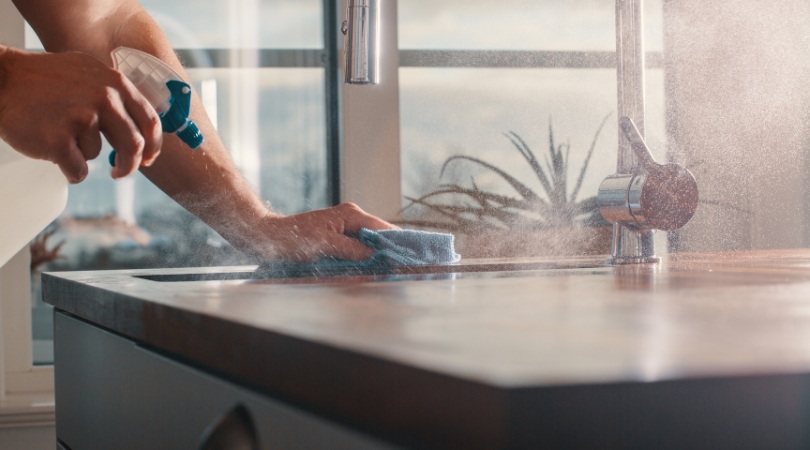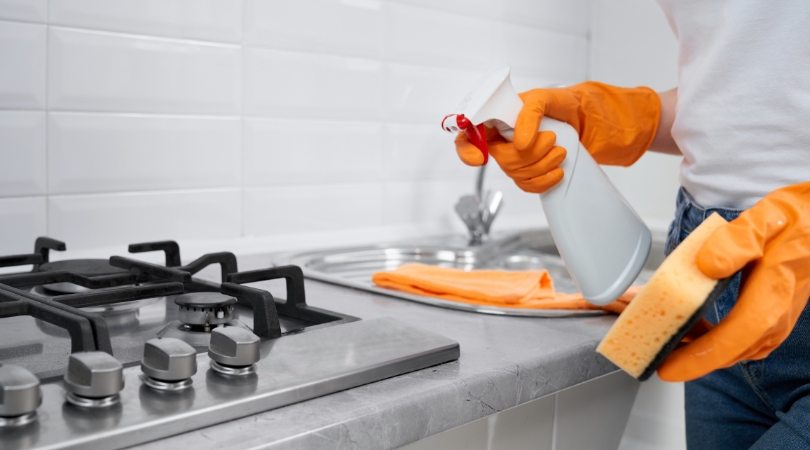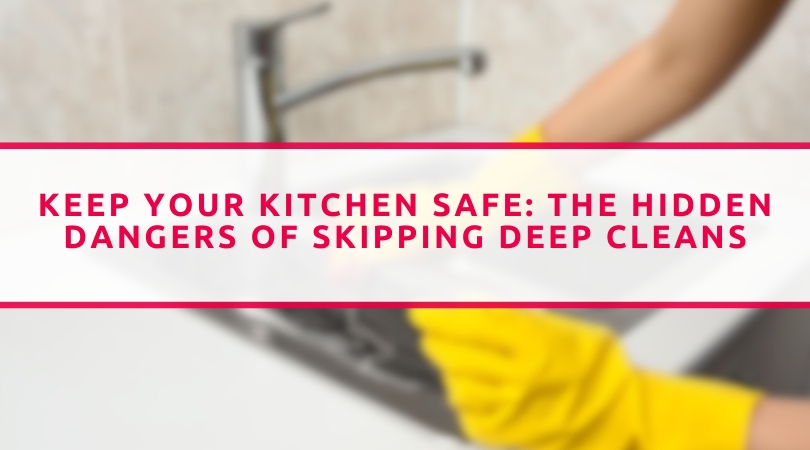
Tips For Cleaning and Maintaining Office Electronics
April 2, 2024
The Most Overlooked Places in Your Home That Need Cleaning
May 27, 2024Picture yourself stepping into your kitchen, ready to whip up your favourite meal. The aroma of sizzling spices and savoury sauces fills the air, promising a delightful culinary experience. But hold on a moment—beneath this inviting facade lies a silent threat that could compromise your kitchen haven’s safety.
Today, we’re delving into kitchen hygiene, shedding light on the often-overlooked importance of deep cleaning. Join us as we uncover the surprising risks lurking in the nooks and crannies of your culinary space. From uninvited pests to unseen bacteria, it’s time to get real about the dangers of neglecting deep cleaning in your kitchen. So, grab a cuppa and let’s navigate through this essential journey together!
The Hidden Dangers in Your Kitchen:

A: Pests:
Ever had an uninvited guest crash your dinner party? Neglecting deep cleaning can open the door to unwanted critters, from pesky cockroaches to determined ants and even sneaky rodents. These unwelcome visitors thrive in messy environments, turning your neglected kitchen into their cosy hideaway.
B: Bacteria and Food Contamination:
Looks can be deceiving—while your kitchen may appear spotless, harmful bacteria could lurk beneath the surface, waiting to wreak havoc on your health. Without regular deep cleaning, bacteria can multiply on surfaces, utensils, and even in your food, leading to nasty foodborne illnesses like salmonella and E. coli.
C: Mould and Mildew:
Dark, damp corners of your kitchen provide the perfect breeding ground for mould and mildew. Neglecting to clean these areas can result in unsightly patches of mould on walls, ceilings, and even your groceries. But it’s not just about appearances—mould can also trigger respiratory issues and allergic reactions, risking your family’s health.
Consequences of Neglecting Deep Cleaning:
A: Health Hazards:
The presence of pests, bacteria, mould, and mildew in your kitchen isn’t just unsightly—it’s dangerous. Exposure to these contaminants can lead to a range of health issues, from minor stomach upsets to severe allergic reactions and respiratory problems.
B: Damage to Appliances and Surfaces:
Dirt and grime buildup isn’t just a cosmetic concern—it can also wreak havoc on your kitchen appliances and surfaces. Grease accumulation on stove hobs and ovens can affect their performance, while mould growth on walls and ceilings can weaken their structure over time, resulting in costly repairs or replacements.
Importance of Regular Deep Cleaning:

A: Prevention is Key:
The best defence against the hidden dangers of neglecting deep cleaning? A proactive approach. Regular cleaning keeps pests, bacteria, mould, and mildew at bay. By staying ahead of the game, you can prevent infestations, illnesses, and structural damage in your kitchen.
B: Tips for Effective Deep Cleaning:
Ready to roll up your sleeves and tackle those hidden hazards head-on? Start by highlighting often-overlooked areas like behind appliances, inside cabinets, and underneath sinks. Armed with the right cleaning products and techniques, you can banish dirt, grime, and germs from every corner of your kitchen.
Conclusion:
When it comes to kitchen hygiene, there’s no room for shortcuts. The dangers of neglecting deep cleaning are real and far-reaching, posing risks to your health and your culinary space’s integrity. By prioritising regular deep cleaning and adopting effective cleaning practices, you can create a safe and inviting environment for you and your loved ones. So, the next time you step into your kitchen, remember to take a closer look—because when it comes to safety, the devil is in the details.
FAQs (Frequently Asked Questions):
1. How often should I deep clean my kitchen to prevent the dangers mentioned in the blog?
It’s recommended to deep clean your kitchen at least once every three months. However, if you cook frequently or have a busy household, you may need to deep clean more frequently, such as once a month.
2. Are there any eco-friendly cleaning products that can effectively tackle the hidden dangers in my kitchen?
Yes, several eco-friendly cleaning products are available that are effective at tackling pests, bacteria, mould, and mildew. Look for environmentally friendly, biodegradable, or non-toxic products, and consider using natural ingredients like vinegar, baking soda, and lemon juice for DIY cleaning solutions.
3. What common signs indicate my kitchen may need a deep clean?
Some common signs that your kitchen may need a deep clean include lingering odours, visible grease buildup on surfaces and appliances, sightings of pests or insect droppings, and the presence of mould or mildew in damp areas. Additionally, if you or your family members frequently experience unexplained illnesses or allergic reactions, it may be a sign that your kitchen needs a thorough cleaning.
Dive into our newest article, “Tips For Cleaning and Maintaining Office Electronics,” for comprehensive insights into fostering a pristine workplace environment, discovering how cleanliness boosts productivity and uplifts employee well-being.


